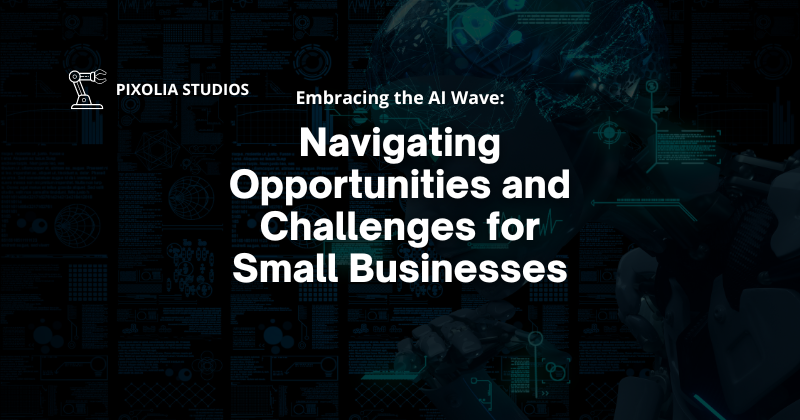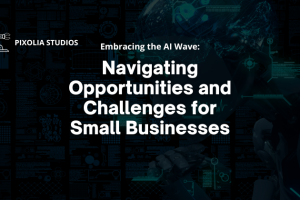In today’s dynamic business landscape, there’s a buzzword that seems to be on everyone’s lips: AI, or Artificial Intelligence. But what exactly is AI, and why is it causing such a stir among small businesses? Let’s embark on a journey to uncover the mysteries of this technological revolution and explore how it can shape the destiny of small enterprises.
At its core, AI refers to the simulation of human intelligence processes by machines, especially computer systems. From learning, reasoning, and problem-solving to perception and language understanding, AI encompasses a broad spectrum of capabilities that are revolutionizing industries worldwide.
Picture this: machines that can learn from experience, adapt to new inputs, and perform tasks that traditionally required human intelligence. That’s the essence of the AI revolution sweeping across industries, disrupting the status quo and reshaping the way we work, live, and interact.
In the realm of small businesses, AI holds immense promise as a game-changer. While larger corporations may have the resources to invest heavily in AI technologies, small enterprises can level the playing field by leveraging AI to enhance efficiency, improve decision-making, and deliver exceptional customer experiences.
1. Enhance Efficiency: AI automates repetitive tasks, allowing small businesses to streamline operations and allocate resources more effectively. By reducing manual workload and optimizing processes, AI frees up valuable time and manpower for strategic initiatives.
2. Improve Decision-Making: AI-powered analytics provide small businesses with actionable insights derived from vast amounts of data. By leveraging predictive modeling, trend analysis, and sentiment analysis, businesses can make informed decisions that drive growth and profitability.
3. Personalize Customer Experiences: AI enables small businesses to deliver personalized experiences tailored to individual customer preferences and behaviors. From product recommendations and targeted promotions to proactive customer support, AI enhances engagement and fosters customer loyalty.
4. Drive Innovation: AI fuels innovation by enabling small businesses to explore new ideas, experiment with emerging technologies, and iterate rapidly. From developing AI-powered products and services to implementing novel business models, AI empowers small businesses to stay ahead of the curve in a rapidly evolving market landscape.
5. Expand Market Reach: AI-powered marketing tools and algorithms help small businesses identify and reach their target audience more effectively. By optimizing advertising campaigns, content strategies, and social media engagement, AI amplifies brand visibility and attracts new customers.
6. Stay Competitive: In today’s digital economy, AI is no longer a luxury but a necessity for small businesses looking to stay competitive. By embracing AI technologies strategically, small enterprises can differentiate themselves from competitors, adapt to changing market dynamics, and future-proof their business operations.
7. Foster Growth: Ultimately, the strategic adoption of AI enables small businesses to scale and grow in a sustainable manner. By unlocking new efficiencies, insights, and opportunities, AI empowers small enterprises to expand their market presence, increase revenue streams, and achieve long-term success in an increasingly competitive landscape.
Imagine a world where mundane tasks are automated, customer interactions are personalized, and data insights drive strategic decisions. This is the reality that AI offers to small businesses, presenting a plethora of opportunities to thrive in a competitive market landscape.
Now, let’s delve into the specific opportunities that AI brings to small businesses:
- Automation of Routine Tasks: AI enables small businesses to automate repetitive tasks such as data entry, invoicing, and inventory management, freeing up valuable time and resources to focus on more strategic initiatives.
- Enhanced Customer Experience: By leveraging AI-powered chatbots, recommendation engines, and personalized marketing campaigns, small businesses can deliver exceptional customer experiences that drive satisfaction and loyalty.
- Data-Driven Decision Making: With AI analytics tools, small businesses can harness the power of data to make informed decisions, identify trends, and anticipate market shifts, gaining a competitive edge in their industry.
- Improved Marketing Strategies: AI enables small businesses to optimize their marketing efforts by analyzing consumer behavior, segmenting audiences, and delivering targeted messages that resonate with their target market.
- Streamlined Operations: From supply chain management to logistics and beyond, AI streamlines operations across departments, optimizing processes and minimizing wastage, leading to greater efficiency and cost savings.
AI empowers small businesses to automate repetitive tasks, freeing up valuable time and resources that can be redirected towards more strategic endeavors. From data entry and invoice processing to inventory management and customer support, automation streamlines operations and boosts productivity.
AI enables small businesses to cater to the unique needs and preferences of their customers. Through predictive analytics, chatbots, and recommendation engines, businesses can deliver tailor-made solutions, fostering loyalty and driving sales.
With AI-powered analytics, small businesses can harness the power of data to make informed decisions, identify trends, and anticipate market shifts. Whether it’s optimizing pricing strategies or refining marketing campaigns, data-driven insights pave the way for success.
Improved Marketing Strategies
With the assistance of AI, they can revolutionize their marketing efforts, ensuring they reach the right audience with the right message at the right time. Here are some ways AI enhances marketing strategies:
Consumer Behavior Analysis: AI algorithms analyze vast amounts of consumer data, including browsing history, purchase behavior, and social media interactions, to gain insights into customer preferences and trends. This analysis helps businesses understand their audience better and tailor marketing messages accordingly.
Audience Segmentation: AI-powered tools segment audiences based on demographics, interests, and behaviors, allowing businesses to create highly targeted campaigns. By delivering personalized content to specific audience segments, businesses can increase engagement and conversion rates.
Content Personalization: AI algorithms dynamically personalize content based on individual user preferences, browsing history, and past interactions. Whether it’s recommending products, customizing email newsletters, or serving targeted ads, personalized content drives higher engagement and fosters brand loyalty.
Predictive Analytics: AI predictive analytics forecast future trends and customer behavior, empowering businesses to anticipate market shifts and proactively adjust their marketing strategies. By leveraging predictive insights, businesses can stay ahead of the competition and capitalize on emerging opportunities.
Marketing Automation: AI-powered marketing automation platforms streamline repetitive tasks such as email scheduling, social media posting, and ad campaign management. Automation frees up time for marketers to focus on strategy and creativity, improving overall campaign effectiveness and ROI.
With AI revolutionizing marketing strategies, small businesses can level the playing field against larger competitors and achieve significant growth in the digital marketplace. By harnessing the power of AI to understand their audience, personalize content, and automate marketing processes, small businesses can reach new heights of success in the age of digital marketing!
Despite its transformative potential, the adoption of AI poses several challenges for small businesses. From cost constraints and technical expertise to data privacy concerns and workforce displacement, navigating the AI landscape requires careful planning and strategic foresight.
Cost of Implementation – While AI offers a myriad of benefits, the initial investment required for implementation can be a significant barrier for small businesses with limited resources. From acquiring software licenses to hiring specialized talent, the cost of entry into the AI arena can be prohibitive, requiring careful budgeting and resource allocation.
Lack of Technical Expertise – In a world where AI talent is in high demand, small businesses may struggle to find the expertise needed to harness the full potential of AI technologies. From data scientists and machine learning engineers to AI developers and cybersecurity experts, building a capable team requires patience, perseverance, and a willingness to invest in talent development.
Data Privacy and Security Concerns – As small businesses embrace AI-powered solutions, they must also grapple with the inherent risks associated with data privacy and security. From safeguarding sensitive customer information to complying with regulatory requirements, maintaining the integrity and confidentiality of data is paramount in the digital age.
Integration with Existing Systems – For small businesses with legacy systems and processes, integrating AI technologies can be a daunting task. From compatibility issues and interoperability challenges to resistance to change among employees, seamless integration requires careful planning, collaboration, and stakeholder buy-in.
Workforce Displacement – As AI automates routine tasks and augments human capabilities, concerns about job displacement and workforce reskilling loom large on the horizon. For small businesses, striking a balance between technology and human capital is essential, fostering a culture of continuous learning and adaptation to thrive in the AI-driven economy.
In the face of these challenges, it’s easy to feel overwhelmed, but don’t let them deter you from harnessing the power of AI for your business. Yes, the road may be bumpy at times, with obstacles like cost, expertise, and security concerns cropping up along the way. However, remember that every challenge presents an opportunity for growth and innovation!
Consider starting small, gradually investing in AI solutions that align with your business goals and budget. Seek out partnerships with AI service providers who can offer guidance and support tailored to your needs. Prioritize data security and compliance, implementing robust measures to safeguard your customers’ information and build trust.
And most importantly, don’t forget about your most valuable asset—your workforce. Embrace AI as a tool to augment their capabilities, rather than replace them. Invest in training and upskilling initiatives to empower your team to thrive in the AI-driven economy!
The world of AI is always changing, with new tech and trends popping up left and right. To keep up, stay flexible by keeping an eye on what’s happening in the industry, getting input from your team and partners, and tweaking your AI game plan as needed. In the end, the AI revolution offers both challenges and chances for small businesses to shine in today’s digital world. By smartly embracing AI, you can boost efficiency, spark innovation, and open up fresh paths to success. So, roll up your sleeves, invest wisely, and team up with others—because the sky’s the limit for small businesses ready to ride the AI wave to victory!










